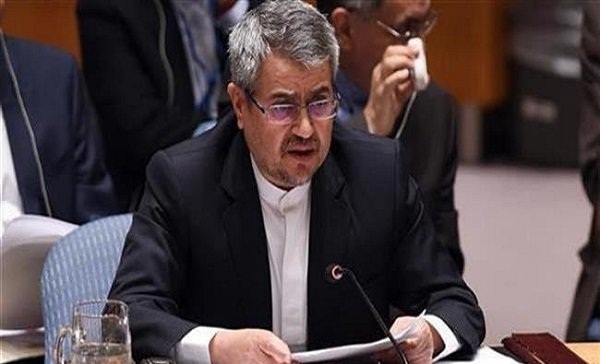Iran Urges Ideological Fight against FTFs
 TEHRAN (Defapress) –In an address to the High-Level Conference of the Heads of Agencies combating Terrorism, held at the UN headquarters in New York, Gholam Ali Khoshroo called for the international community’s urgent action against the threat of foreign terrorist fighters.
TEHRAN (Defapress) –In an address to the High-Level Conference of the Heads of Agencies combating Terrorism, held at the UN headquarters in New York, Gholam Ali Khoshroo called for the international community’s urgent action against the threat of foreign terrorist fighters.
In his statement, made at the conference’s second panel on ‘Combatting the evolving threat from Foreign Terrorist Fighters’, the Iranian ambassador said “only a destructive ideology could turn an otherwise peaceful human into a destructive being.”
What follows in the text of Khoshroo’s statement:
“In the name of God, the most Compassionate, the most Merciful
Mr. Chairman,
Ladies and Gentlemen,
Relevant UN reports indicate that over 25,000 Foreign Terrorist Fighters (FTFs) had gone to Syria from over 100 Member States. This figure demonstrates that the threats related to the FTFs is complicated and multi-faceted and needs urgent attention of the international community. As our world increasingly recognizes no borders, all parts of the world are being more or less threatened by this spreading scourge.
In analyzing the root causes of joining of individuals to FTFs, while we agree that such factors as dictatorship, poverty, corruption and discrimination could serve as contributing factors under certain circumstances; abundant experience and facts clearly show that only a destructive ideology could turn an otherwise peaceful human into a destructive being. This dark extremist ideology is commonly used to legitimize acts of violence and cannot be eliminated only through military, political, or economic means. Any effective strategy against FTFs must entail in the first place a major cultural and ideological component.
It is also essential that the Member States strengthen their cooperation at the international, regional, sub-regional and bilateral levels, including through enhanced operational and timely information-sharing.
Iran is a victim of terrorism including operations conducted and sponsored by the Taliban, Al-Qaida, MKO and ISIS. Over the past four decades, around 17,000 Iranian citizens have been affected by terrorist attacks.
The measures adopted by my Government in response to the relevant Security Council and GA resolutions have been reported to the CTED and the CTC. We have augmented and intensified the practical arrangements to ensure, among other things, the safety and security of civil aviation, increased security at borders with a view to preventing the entry of terrorists, including FTFs, into our territory and enhanced anti-laundering mechanisms in the banking system.
Moreover, the national strategy for countering terrorist acts was adopted in 2013 by the Supreme National Security Council of the Islamic Republic of Iran. Furthermore, Iran has strengthened its legal frameworks and criminal system, including by adoption of National Legislation concerning Suppression of the Financing of Terrorism. This legal framework has enhanced international cooperation and collaboration to prevent and respond to the threat from FTFs by strengthening border control. International Police Unit of Iran is an active member of Interpol. It has strong working relations and cooperation with Interpol including, in the area of exchange of information such as terrorist movements. Iranian Passport Police at land and air borders is using the Interpol database for detecting possible terrorist infiltration or movement through our borders.
On the international level, we are of the view that any action in countering this phenomenon should be taken through collective coordination and involve the cooperation of governments, particularly in the information sharing and notification. To this end, the Islamic Republic of Iran has signed mutual legal assistance agreements with more than 40 countries.
Finally, Mr. President, Iran supports developing a common regional strategy to counter terrorism and enhance cooperation among regional States. By having such a common strategy, the countries in the region could effectively stop the TFTs movement and their infiltration into our countries.
I thank you Mr. Chairman.”
message end/
